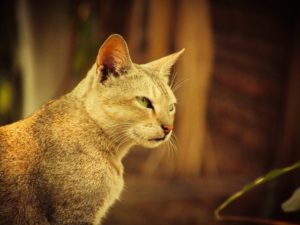Cats lick and groom themselves all day. They also scratch themselves excessively when they have fleas or some other irritating small bugs/insects sitting in their fur. As a result, they end up swallowing some of their own loose fur and because it can’t pass through their digestive system, it becomes a ball of fur, better known as hairballs.
As you can probably imagine, it can cause discomfort so they try to cough up the hairballs to remove it from their system.
An occasional hairball (one every 10 days or so) is considered normal but if your cat is throwing up hairballs daily, it may be a sign of an underlying health problem which calls for a visit to the vet’s office.
How do you know if your cat has a hairball blockage?
If your cat is trying to throw up but can’t, it’s a sign that there is some kind of hairball blockage. I admit, it’s scary when they gag and you don’t know what to do or how to help a cat cough up a hairball.
They may show additional signs such as constipation, vocalisation due to abdominal pain, restless pacing due to discomfort, vomiting & lethargy. If you see any of these symptoms, it could mean the hairballs have passed through the gut to their intestine causing intestinal blockage in the cat.
Try these 3 Natural hairball remedy for cats
While hairballs aren’t usually a big problem, if you’ve ever noticed the unpleasant cough and the mess that follows, you can’t help but wonder how to prevent cat hairballs in the first place.
Similar to humans shedding hair, hairballs are pretty common in cats. Even though hairball prevention is better than cure, it’s not always practical to prevent cat hairballs although there are a few things you can do to minimize it.
Brushing
Cats need to be brushed regularly to maintain the health of their fur coat. Routine brushing removes the loose fur and helps minimize the amount of loose fur they accidentally swallow. A good side benefit is it helps with better blood circulation.
It’s a daily ritual for us to brush Honey. But not many cats like getting brushed. They run, hide and may give you a hard time although they get used to it eventually. As a matter of fact, they may even appreciate it as they notice your efforts to take care of them. Needless to say, a few minutes of brushing every day is an opportunity to strengthen the bond with your cat.
Coconut Oil
Adding an occasional dose of coconut oil to their food will help your cat pass a hairball. Coconut oil improves digestion and acts as a lubricant by increasing the moisture of the stool. Furthermore, coconut oil in small quantities can strengthen their immune system and help reduce bad breath and arthritis in cats.
However, not all cats take a liking to coconut oil. Our cat fusses over it so we simply spray a few drops of coconut oil on to our cat’s paw. This is a good way to make reluctant cats ingest the coconut oil. This by the way, is how we also give medication to our cat.
Change their diet
I’m not sure if many cat owners know this but there is a specific type of food for hairballs in cats. Speak to your vet to find out the best food for cat hairball prevention. In general, foods high in fiber stop hairballs from forming in the stomach. If you’re wondering how to help your cat pass a hairball, fiber is your answer. Increasing your cat’s fiber intake will help the swallowed fur move easily through the digestive tract and get eliminated through the bowels. Additionally, a balanced diet helps minimize shedding and improves the health of the fur coat.
Can hairballs cause diarrhea in cats?
Cat hairballs can cause a partial or complete gastro intestinal blockage which can lead to diarrhea as your cat’s system is trying hard to get rid of the hairballs in every way it can.
Can cats die from a hairball?
Hairballs are rarely a cause for concern. Your cat should be able to vomit the hairball on his own or with the help of a natural remedy. However, if you’ve tried everything but still your cat can’t cough up the hairball, it could signal the presence of multiple hairballs or one large hairball. Further, this can result in the physical obstruction of the small intestine which can be fatal to cats. In such cases, vets usually recommend cat owners to get the hairball removed through a surgery.
Summary
Some cat owners swear by the most common vet recommended hairball remedy such as digestive hairball relief supplements and lubricating paw gels. Some vets even recommend hairball control cat treats but after reading some of the reviews of a few commercially well-known cat hairball control treats, I am convinced that unless the problem is serious, cat hairball home remedy is the way to go.




